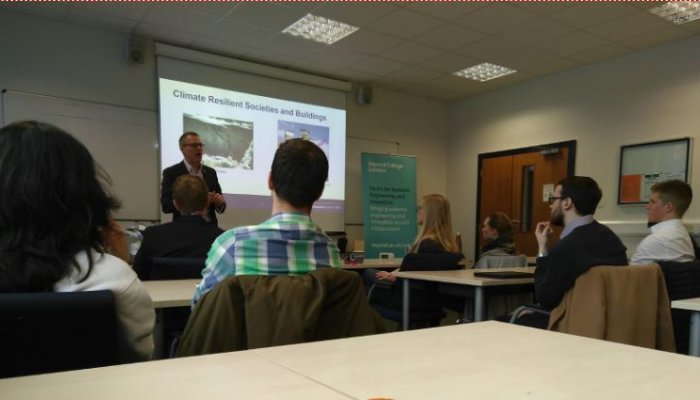CSEI seminar series - Professor Malcolm Cook
by Tim Gordon

CSEI seminar series - Professor Malcolm Cook
On Wednesday 19th Febraury 2020 the Centre for Systems Engineering & Innovation hosted Professor Malcolm Cook – Building Performance Analysis, Loughborough University
TITLE – Designing with Natural Ventilation in Challenging Climates
This seminar presented a number of state-of-the-art low energy building design solutions from around the world and explained the role that building performance simulation played in their design. There has been a significant increase in demand for cooling and refrigeration over recent years and using natural ventilation for cooling is a technique that is not new, however there is a lack of awareness of how it can be applied in modern building design. The challenge is in incorporating the wide variation of influencing factors into a model that can be used to guide the design of a building with effective ventilation, cooling and heating that is needed. The approach used is to establish a comfort envelope that will guide the principles of the design and aim for the 10 litres of fresh air per person per second that is considered optimal. For example the location of a building will have a significant effect on the ability of the building to self-cool overnight and as a result design is crucial to ensure adequate ventilation and cooling.
Malcolm presented a case study of work that was completed to support the concept design of a building in Guangzhou. The work was completed in three days and the team used climate data to influence the final design which was evolved through detailed computational analysis. Conclusions drawn by the team from this project and a number of others, are that monthly cooling loads can be impacted significantly by running a hybrid cooling system. The large proportion of savings are seen when running the system in the shoulder months either side of summer. Using further case studies from the UK, USA and India, Malcolm demonstrated how research and advanced computational modelling was used for real world building designs, and detailed the importance of control, commissioning and post completion monitoring. By adopting Climate sensitive design (NV potential) and maintaining effective control over mixed mode systems savings of up to 45% can be realised.
Abstract:
This seminar will present state-of-the-art low energy building design solutions from around the world and the role building performance simulation can play in their design. The seminar will include advice and techniques for concept building design and illustrate appropriate use of building performance analysis tools. The focus of the seminar will be on ventilation and its control, although details of how this integrates with other, key, low energy features of the building, will be presented.
Case studies from the UK, USA and India will be used to illustrate the impact of climate on low energy building design. In all cases, details of how research and advanced computational modelling was used for these real world building designs will be presented, as well as the importance of control, commissioning and post completion monitoring.
The seminar will conclude with a look at the latest research being undertaken in the area of ventilation effectiveness as a means of driving down energy consumption associated with winter heating.
Bio:
Malcolm Cook is Professor of Building Performance Analysis in the School of Architecture, Building and Civil Engineering at Loughborough University and leads work on indoor air quality and thermal comfort modelling. For the past 20 years he has worked on the design and performance of natural and mixed mode ventilation systems and is one of the world’s leading experts on Computational Fluid Dynamics modelling of natural ventilation. Outputs from research projects have included: a new coupled airflow/thermal comfort simulation tool, design guidance for the use of computational fluid dynamics for modelling natural ventilation, and a new sensor and control device for monitoring and controlling naturally ventilated environments. He has published over 60 refereed journal papers and his work has been used in several CIBSE and ASHRAE publications
Article text (excluding photos or graphics) © Imperial College London.
Photos and graphics subject to third party copyright used with permission or © Imperial College London.
Reporter
Tim Gordon
Department of Civil and Environmental Engineering